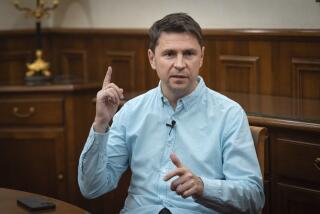NEWS ANALYSIS : Gorbachev’s Deal: A Share of Power for Republics, a Stronger Hand for Himself
- Share via
MOSCOW — Soviet President Mikhail S. Gorbachev is offering his country a new political deal, a broadening of local government rights in exchange for an increase in his powers. Most here will doubtless ask: Will this put meat in the shops? Will it end the turmoil in the Caucasus?
“People are tired and expect radical measures,” one member of the Supreme Soviet (legislature) said last weekend. “They have no faith in the president, the prime minister, the Supreme Soviet.” Give them dependable supplies of bread and medicine, she said, and again there will be trust.
By eliminating the post of chairman of the Council of Ministers, or Soviet prime minister, and taking direct command of the state bureaucracy, Gorbachev seeks to do just that.
At one stroke, he would become the day-to-day chief of the ministries that millions of his countrymen accuse of thwarting reform and also gracefully dispose of an ally, Prime Minister Nikolai I. Ryzhkov, who is now a political liability.
Gorbachev’s proposals for the overhaul of the executive branch, sketched in his brief speech to the national legislature Saturday, raise many questions, but perhaps the most fundamental is what the reaction of populist Boris N. Yeltsin will be.
If Yeltsin, the president of the Russian Federation and the most respected politician in the country, were to declare his opposition to the plan, its success would be inconceivable.
At first, Yeltsin associates such as Vladimir K. Varov, chairman of the Russian legislature’s panel on political reform, seemed to reject Gorbachev’s ideas as an infringement on Russia’s sovereignty. But on Sunday, the Tass news agency said that Deputy Prime Minister Grigory Yavlinsky had concluded that Gorbachev’s proposals and Yeltsin’s appeal for a national coalition government “are not incompatible.”
Everything now depends on “how people will implement the president’s ideas, what course of action they will take and what mechanism they will use,” the Russian government official told Tass, sounding as though the only remaining dispute with Gorbachev could be over means and tactics.
However, the exact opinion of Yeltsin himself remained unknown. He pointedly stayed away from the Kremlin the morning that Gorbachev spoke, and he flew to the Ukraine on Sunday to sign a treaty establishing “fundamentals of relations” with that republic, another manifestation of the fracturing of Soviet political power.
However, comparing Gorbachev’s plan and the emergency measures Yeltsin had recommended to the national legislature on Friday showed apparent points of convergence. Among them:
Yeltsin asked for a vote of no-confidence in Ryzhkov and his ouster; Gorbachev wants the 61-year-old prime minister’s job eliminated, although the longtime Gorbachev ally from the Urals could conceivably wind up with some other post.
* Yeltsin seeks an “anti-crisis committee,” with representatives from all 15 Soviet republics, to lead the country out of crisis; Gorbachev called for upgrading the Federation Council, on which Yeltsin and leaders of the other republics serve, to make it the supreme organ of government.
* Finally, Yeltsin called for a government of “national unity” in which other parties and factions could share power with Communists; Gorbachev told the Supreme Soviet that he wants to infuse the Kremlin leadership with “new, enterprising people with a modern mentality.”
Evidently, Gorbachev’s proposals are the core of the new union treaty he is advocating to replace the 1922 agreement that created the Union of Soviet Socialist Republics, and which soon became a cover for dictatorial Communist Party rule from Moscow. The text of the proposed new treaty should be published soon.
In brief, the Soviet president is offering local elites a stake in a revamped Kremlin power structure by granting the leaders of the republics, sitting with him on the Federation Council, the right of review over “everything touching the interests of the entire country.”
That sounded alluring, but Soviet officials later made it clear that Gorbachev would have the final say, even if the leaders of the 15 republics dissented. What’s more, a totally separate body, the National Security Council, will take charge of defense, security matters and foreign policy.
To have no direct say in those key elements of statehood would be unacceptable for republics such as Latvia and Georgia, which aspire to complete independence, and perhaps for Yeltsin’s Russia as well, although he has spoken in favor of a new union treaty.
Ryzhkov, Gorbachev’s prime minister since nearly the beginning of the social and economic reforms now collectively known as perestroika, has become the bugbear of progressives and radicals. They blame him for torpedoing their efforts to dismantle the “command system” of state economic management and create the basis for free enterprise.
Conversely, many conservatives have come to see in him a weak and ineffective technocrat. On Saturday, speakers from the left and right joined in the Supreme Soviet to call for a stronger hand. The president should be given such powers, Grigory Podberezsky of Byelorussia told Gorbachev, “so that people not only obey you, but also fear you.”
A deeper question is how great an effect even Gorbachev can have on the nation’s economic and social life if Soviet legislators grant his wish and create the institutions he wants.
If Gorbachev, already the general secretary of the Communist Party and Soviet president, has been unable to arrest economic decline and force obedience of laws and his decrees with the already impressive powers and institutions at his command, there is a question how much an institutional reshuffle can accomplish.
More to Read
Sign up for Essential California
The most important California stories and recommendations in your inbox every morning.
You may occasionally receive promotional content from the Los Angeles Times.













